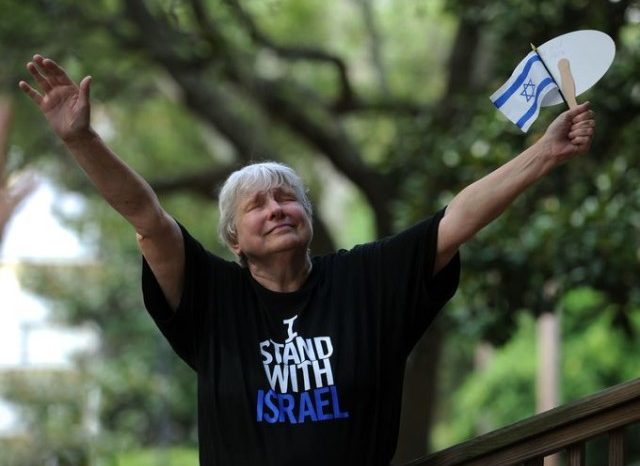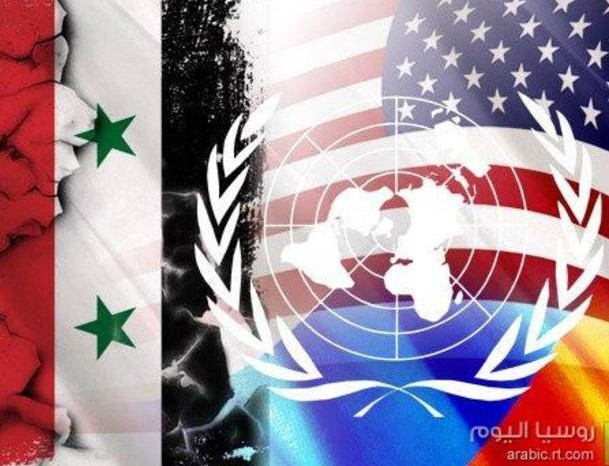Florida Legislature Unanimously Passes Resolution for Israel

Florida State Representative Mike Hill, Pensacola Stand for Israel Rally. Source: John Blackie, PNJ
The Pensacola Rally for Israel witnessed an outpouring of support in the Northwest Florida community for the Jewish nation exceeding organizers’ expectations. The rally, sponsored by the Pensacola Jewish Federation, was underwritten by anonymous donors from the Jewish community.
The Pensacola Police security detail estimated the crowd in excess of 500 attendees. The large polite crowd was composed of Jews from several denominations, Baptists, Pentecostals and other Christian groups. Mike Bates of Northwest Florida’s AM 1330 WEBY and this writer served as co-hosts for the rally.
A climactic event was the appearance of Florida House Representative Mike Hill. A Pensacola News Journal article on the rally, “Hundreds gather to support Israel,” reported: “He brought the crowd to their feet when he announced a Stand with Israel resolution to be voted on in a special session this week in Tallahassee.”
Hill said:
What is being done to Israel is evil. Israelis are our allies, and they need our support. Let’s show the nation that Florida is leading the way in support for Israel.
Rep. Hill texted both Bates and the author on the afternoon of August 11th that the House unanimously passed a resolution supporting Israel in Operation Protective Edge and condemning Hamas. Hill commented in a text message: “proud of the body, today.” Sen. Alan Hays texted a companion unanimous vote in the Florida State Senate.

Mike Bates of 1330AM radio WEBY, Pensacola Stand for Israel host at the Western Wall in Jerusalem, March 2014.
Mike Bates set the agenda for the rally program saying:
We’re here to stand up for the good guys. To stand with the truth, to stand with what is right, to stand with justice. We are here today to stand with Israel.
There were several emotional moments during the rally. Mike Bates periodically would advise the crowd of the minutes since the last rocket was fired from Gaza headed towards Israel. He followed this with a request for a moment of silence to pray for Israelis threatened by terror from the skies. There were also moments of silence praying for the protection of Christians and other religious minorities confronting the barbarism of the Islamic State, formerly ISIS.
ates drew attention to the irony that in the midst of this conflict, Israel continued to supply food, gas, water and electricity to Gazans living under the tyranny of Islamist extremist Hamas. He remarked to the audience he couldn’t conceive of the US doing that during WWII. Several speakers drew attention to Hamas’ launch of rockets near or from UNWRA schools, hospitals, mosques, churches, or residences using civilians as human shields.
This author was also interviewed by the PNJ following opening remarks. As cited in their report, I said:
Americans incorrectly perceive Israel to be the villains in the current fighting because the media doesn’t report the historic context of the conflict. While I hoped a resolution to the fighting could be found, certain conditions would have to be met. The only breakthrough would come if they negotiated a deal to demilitarize Gaza. However I said that the chances of that are really low, unfortunately. One never knows what may happen, but certainly there is a lot of regional sentiment for that.
The genesis for the rally had been sparked in early July with onset of Hamas’ rocket and terror tunnel war against Israel and Israel’s response in Operation Protective Edge. That led to a series of weekly one hour updates and discussions on WEBY‘s talk radio program, “Your Turn,” hosted by Bates. Public service announcements (PSA) followed in earnest after a city public park site was secured by the local Jewish Federation for a Stand for Israel rally. This was preceded by a series of pro-Gaza rallies by Palestinian activists in downtown Pensacola. The radio discussions and PSA’s at WEBY were materially assisted by distribution of flyers, announcements from synagogue, temple and church pulpits. Event and news releases were sent to media outlets in the combined Northwest Florida and adjacent Eastern Alabama.
The rally occurred on a hot and sultry day with a heat index in the high 90’s and a 70 percent chance of thunderstorms forecast. Ha Shem must have looked with favor on the event as thunderstorms held off. A minor miracle, not quite those cited by several speakers at the rally who drew attention to several that spared both Tel Aviv and IDF forces in combat from death and destruction. There was a Hamas rocket that failed to be intercepted by three Iron Dome missiles headed for Tel Aviv. Suddenly, a wind arose from the east blowing it to fall harmlessly into the Mediterranean. There was a contingent of IDF soldiers about to go on a daytime mission into Gaza that was cloaked in a fog. They successfully completed their mission without a casualty. There was a bird that alighted on a trip wire in a Hamas terror tunnel during a clearance operation by IDF troops, triggering an explosion of booby traps, sparing Israeli casualties.

Rabbi Joel Fleekop Temple Beth El Penscola, FL. Source: John Blackie, PNJ.
The rally organizers had lined up a broad array of local, regional, national and international speakers. Rabbi Joel Fleekop from Temple Beth El in Pensacola gave a thoughtful and spiritually uplifting invocation. Rabbi Steven Silberman, of Mobile Synagogue Ahavas Chesed, spoke of his eyewitness to Hamas’ rocket war in Israel noting it was his first exposure to the chilling red alert wailing sirens. He also had a chance meeting with two Polish Catholic women, surprised to find an American rabbi at their hotel during the conflict. Fred Zimmerman, a member of the National Jewish Federation campaign cabinet from Nashville, spoke via phone to the rally attendees about his experience in Israel during Operation Protective Edge and the Federation’s Stop the Sirens campaign.
Jerry Barnett of Volunteers for Israel told of the group’s mission to enlist civilian volunteers to assist in the maintenance of IDF bases. He read an email requesting volunteers of all ages to sign and assist Tzahal at this time of need. Kenneth E. Lamb, a member of a local Pentecostal church spoke of the covenant relationship between Ha Shem and the Children of Abraham, the Jews and Israel. The international speaker at the rally was Dan Diker from Israel who called while on vacation with his family in northern California. Diker is a former secretary general of the World Jewish Council and a noted Middle East Affairs expert with the Jerusalem Center for Public Affairs.
Diker has been on several AM 1330 WEBY International Middle East Round Table discussions. Diker spoke of Hamas and its intentions to obliterate the Jewish people and Israel and the difficulty of obtaining a truce in the face of implacable demands. He noted the dramatic turn of events of Israel receiving tacit support from Arab countries like Saudi Arabia, the UAE and especially Egypt that has cooperated with Israel in closing off the Gaza frontier.
In the midst of Diker’s call there was a sudden outburst of calls of “Israel, Israel, Israel” endeavoring to call out a small contingent of pro-Gaza protesters waving a large Palestinian flag carrying placards accusing Israel of murdering civilians in Gaza.

Pro-Israel Supporters listen to Rabbi Steven Silberman of Cong. Ahavas Chesed, Mobile.
At the conclusion of the rally, Mike Bates quoted these verses from Psalm 122:
6 Pray for the peace of Jerusalem; may they prosper that love thee.
7 Peace be within thy walls, and prosperity within thy palaces.
8 For my brethren and companions’ sakes, I will now say: ‘Peace be within thee.’
9 For the sake of the house of the LORD our God I will seek thy good.
My final comment used the Hebrew words Goy Tzedek or righteous Gentiles to characterize the Christians who attended the rally; followed Am Yisrael Chai, “the people Israel live.”
EDITORS NOTE: This column originally appeared on the New English Review. The featured photo is of Linda Wolfe praying for Israel at Pensacola, FL Rally. Source : John Blackie, PNJ.


